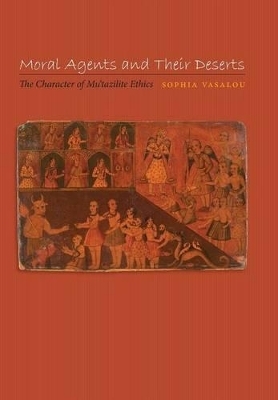
Moral Agents and Their Deserts
The Character of Mu'tazilite Ethics
Seiten
2008
Princeton University Press (Verlag)
978-0-691-13145-0 (ISBN)
Princeton University Press (Verlag)
978-0-691-13145-0 (ISBN)
- Lieferbar (Termin unbekannt)
- Versandkostenfrei innerhalb Deutschlands
- Auch auf Rechnung
- Verfügbarkeit in der Filiale vor Ort prüfen
- Artikel merken
Must good deeds be rewarded and wrongdoers punished? Would God be unjust if he failed to punish and reward? And what is it about good or evil actions and moral identity that might generate such necessities? This book presents a study of Mu'tazilite ethics.
Must good deeds be rewarded and wrongdoers punished? Would God be unjust if He failed to punish and reward? And what is it about good or evil actions and moral identity that might generate such necessities? These were some of the vital religious and philosophical questions that eighth- and ninth-century Mu'tazilite theologians and their sophisticated successors attempted to answer, giving rise to a distinctive ethical position and one of the most prominent and controversial intellectual trends in medieval Islam. The Mu'tazilites developed a view of ethics whose distinguishing features were its austere moral objectivism and the crucial role it assigned to reason in the knowledge of moral truths. Central to this ethical vision was the notion of moral desert, and of the good and evil consequences--reward or punishment--deserved through a person's acts. Moral Agents and Their Deserts is the first book-length study of this central theme in Mu'tazilite ethics, and an attempt to grapple with the philosophical questions it raises.
At the same time, it is a bid to question the ways in which modern readers, coming to medieval Islamic thought with a philosophical interest, seek to read and converse with Mu'tazilite theology. Moral Agents and Their Deserts tracks the challenges and rewards involved in the pursuit of the right conversation at the seams between modern and medieval concerns.
Must good deeds be rewarded and wrongdoers punished? Would God be unjust if He failed to punish and reward? And what is it about good or evil actions and moral identity that might generate such necessities? These were some of the vital religious and philosophical questions that eighth- and ninth-century Mu'tazilite theologians and their sophisticated successors attempted to answer, giving rise to a distinctive ethical position and one of the most prominent and controversial intellectual trends in medieval Islam. The Mu'tazilites developed a view of ethics whose distinguishing features were its austere moral objectivism and the crucial role it assigned to reason in the knowledge of moral truths. Central to this ethical vision was the notion of moral desert, and of the good and evil consequences--reward or punishment--deserved through a person's acts. Moral Agents and Their Deserts is the first book-length study of this central theme in Mu'tazilite ethics, and an attempt to grapple with the philosophical questions it raises.
At the same time, it is a bid to question the ways in which modern readers, coming to medieval Islamic thought with a philosophical interest, seek to read and converse with Mu'tazilite theology. Moral Agents and Their Deserts tracks the challenges and rewards involved in the pursuit of the right conversation at the seams between modern and medieval concerns.
Sophia Vasalou is research fellow in philosophy at Gonville and Caius College, University of Cambridge.
*FrontMatter, pg. i*Contents, pg. vii*Preface, pg. ix*Acknowledgments, pg. xiii*1. The Framework: The Mu'tazilites, pg. 1*2. Reading Mu'tazilite Ethics, pg. 12*3. Theology as Law, pg. 38*4. The Basran Mu'tazilite Approach to Desert, pg. 67*5. Moral Continuity and the Justification of Punishment, pg. 116*6. The Identity of Beings in Basran Mu tazilite Eschatology, pg. 157*Appendix. Translation From Mankdim Shashdiw, "The Promise And The Threat," In Sharh Al-Usulal-Khamsa, pg. 181*Notes, pg. 197*Bibliography, pg. 239*Index, pg. 247
| Erscheint lt. Verlag | 21.7.2008 |
|---|---|
| Verlagsort | New Jersey |
| Sprache | englisch |
| Maße | 152 x 235 mm |
| Gewicht | 510 g |
| Themenwelt | Geisteswissenschaften ► Philosophie ► Ethik |
| Geisteswissenschaften ► Philosophie ► Östliche Philosophie | |
| Geisteswissenschaften ► Religion / Theologie | |
| ISBN-10 | 0-691-13145-7 / 0691131457 |
| ISBN-13 | 978-0-691-13145-0 / 9780691131450 |
| Zustand | Neuware |
| Haben Sie eine Frage zum Produkt? |
Mehr entdecken
aus dem Bereich
aus dem Bereich
unsere kollektive Verantwortung
Buch | Hardcover (2023)
wbg Theiss in Wissenschaftliche Buchgesellschaft (WBG) (Verlag)
35,00 €


